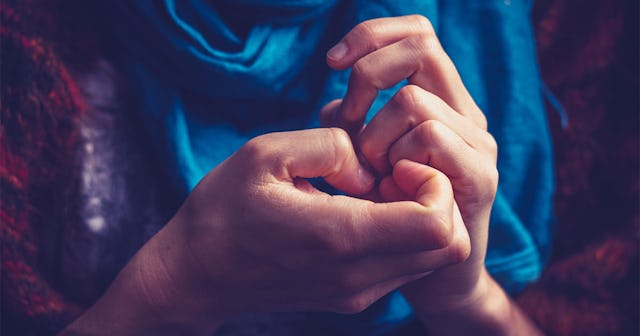Confusion, Skin Picking And 4 Other Unexpected Signs Of Anxiety

Anxiety is common. Very common. In fact, according to the Anxiety and Depression Association of America — or ADAA — anxiety disorders are the most common mental health disorders in the United States. More than 18 percent of the adult population lives with this condition, and I am one of 40 million. For years, I have been plagued by intense feelings of fear, nervousness, and intrusive thoughts. I have also endured my fair share of panic attacks. Just last week, I melted down in the grocery store. I sat, shaking and sweating, on the dairy aisle — wedged between a wall of cheese and an assortment of bread. But there is more to anxiety than restlessness, irritability, hyper vigilance, and excessive worry. Not every panic attack looks like it does in the movies, with someone breathing into a paper bag, and some of the most common anxiety symptoms, habits, and behaviors are also the least well known.
Here are six unexpected signs and symptoms of anxiety.
Skin picking, or dermatillomania
One of the most common — but least talked about — signs of anxiety is skin picking, or dermatillomania. In fact, the condition is believed to affect one in 20 people. “Dermatillomania, or excoriation disorder, [is a] skin picking disorder is where you cannot stop picking at your skin,” the National Health Service explains. And it is a condition I know a lot about. I obsessively pick my lip and the skin on the bottom of my foot, often to the point of pain. I unintentionally (but regularly) bleed. And I am not alone.
Gary, a father in New Jersey, tells Scary Mommy he’s a picker and that the behavior ramps up when he is anxious or stressed. Kristen, a mother of two, picks her cuticles while her daughter scratches her ears, and both Allie and Bethrah pick their lips — like me. When asked why, Kristen explained the act helps ground her. “It takes the attention away from the incessant thoughts and buzzing in my body,” she says. And Gary agrees.
“I feel a little better in the moment because I’m focusing on something else,” he says. “I’m ‘fixing’ a different issue.”
Stomach issues and/or indigestion
From nausea and vomiting to diarrhea and indigestion, anxiety can cause a wide range of digestive issues. According to Very Well Mind, gastrointestinal disturbances are common. The good news is that these symptoms can be treated or, at the very least, managed. With dietary changes, breathing exercises, physical exercise, and over-the-counter medications, you can calm an anxious stomach.
Confusion
Anxiety can cause forgetfulness, confusion, and/or difficulty concentrating, Kristal — a student in New York — tells Scary Mommy. Focus can also be a problem. “When I am stressed and anxious I can’t keep focus. I have a hard time driving and stuff.” She also disassociates, at least to a certain degree. “I don’t wanna throw the word dissociate around, but there is a disconnect between my thoughts and actions.” And this is a symptom I know all too well. When I am extremely anxious, I feel like I am floating. I zone out, space out, and lose all sense of time and space.
There are ways to ground yourself. Exercise can help bring your mind and body back to the present. Journaling can get the anxious thoughts out of your head and heart, and reality-based exercises are also helpful. For example, some believe that running water over your hands can bring you back to reality and help you overcome any confusion-based issues.
Heart irregularities
Do you know what it feels like to have a racing heart? The fluttering. The pounding. Has your heart ever felt as though it would tear through your chest? If so, you’ve likely experienced anxiety- or stress-induced heart irregularities. And while skipped heartbeats and palpitations are common, this symptom is one you don’t want to ignore. You should seek medical attention if these sensations continue or persist.
Physical numbness or tingling
Anxiety-related numbness can manifest in a variety of ways. Some people lose sensation in their hands and limbs while others get that “pins and needles” feeling, the one we experience when an extremity “falls asleep.” Prickling is also common, and a mild burning sensation can also occur. But why does this happen? According to Healthline, anxiety-induced numbness occurs when the body goes into flight or fight mode and/or when you are hyperventilating.
Brain zaps
While brain zaps — or brain shivers — are commonly associated with antidepressant withdrawal, some individuals will experience this sensation in response to stress or anxiety. But what is a brain zap? Well, according to the Anxiety Centre, brain zaps “feel as if your head or brain has been suddenly jolted by an electric shock or electrical charge.” Or, to put it another way, it feels as though “your head or brain has been zapped, buzzed, shocked, jolted, or had a sudden ‘brain, head, or body tremor or shiver.’”
Of course, there are dozens of other anxiety habits, behaviors, and symptoms. This list is not exhaustive or inclusive. But know this: If you live with anxiety, there is help. There is hope, and you don’t have to struggle in silence. You are not alone.
This article was originally published on